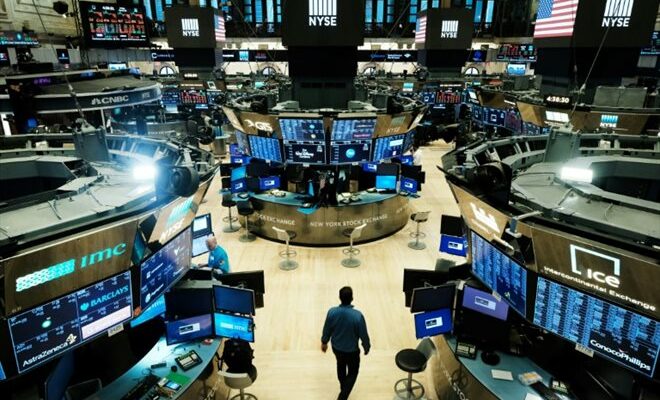The floor of the New York Stock Exchange (GETTY IMAGES NORTH AMERICA/AFP/SPENCER PLATT)
Wall Street concluded with a double record for the Dow Jones and the S&P 500 on Thursday thanks to the surge of Nvidia, a giant in electronic chips used in particular in artificial intelligence.
The Dow Jones gained 1.18% to 39,069.11 points, the S&P 500 climbed 2.11% to 5,087.03 points, allowing these indices to reach new historic highs after those of mid-February.
The tech-dominated Nasdaq climbed 2.96% to 16,041.62 points, also narrowly missing a new record. The previous one dates from November 2021.
The New York Stock Exchange was swept up in the euphoria that gripped global markets after Nvidia’s brilliant results.
The manufacturer of superpowerful chips and graphics cards was driven by the craze for generative AI and interest in these components.
The stock ended up 16.40%, to an all-time high, at $785.38.
At the very least, the group’s market capitalization swelled in one session by more than $200 billion, reaching $1.94 trillion.
Nvidia, one of the “magnificent 7” – these technology mega-capitalizations which include Apple and Microsoft – has moved back ahead of Alphabet and Amazon in terms of market valuation.
“Nvidia showed that AI was here to stay. They disclosed monster profits,” enthused Adam Sarhan of 50 Park Investments.
“This is the fourth time in recent weeks that we have seen companies report magnificent profits thanks to AI,” added the analyst.
He cited SMCI (Super Micro Computer) which jumped almost 33% on Thursday to $975, but also Arm (+4.17%) and Palantir (+3.74%).
In the fourth quarter, Nvidia tripled its revenue, to $22 billion. Profits are nine times higher than those of a year ago, at 12.3 billion.
The group further described the emergence, with generative artificial intelligence, of a “new era of computing” which will introduce itself to all sectors and lead to a vast updating of workstations and data centers .
On the macro-economic side, applications for unemployment benefits in the United States fell, against all expectations, by 12,000 to 201,000 last week.
Home resales performed well in January, increasing by 3.1% over the month but down 1.7% over the year.
Although property loan rates fell in January, they started to rise again this month and have just returned above the 7% mark for a 30-year fixed rate loan.
On the monetary policy front, several members of the Federal Reserve were scheduled to deliver speeches, including two after the market closed.
Fed Vice President Philip Jefferson expressed concern about the inflationary potential of overconsumption in the United States.
“Without a clear understanding of why consumer spending has been so resilient, I view continued spending strength as a significant upside risk to my forecast,” he noted.
On the bond market, ten-year yields stood at 4.32% compared to 4.31% the day before.
Elsewhere on the stock market, the AT&T telecoms group lost 2.41% as its cellular telephone network experienced disruptions affecting several tens of thousands of customers in the United States.
John Kirby, a White House spokesperson, said that “at this point (…) AT&T has no reason to believe that this is a cybersecurity incident.”
The group is in contact with the Federal Communications Commission (FCC) to determine what happened. The Department of Homeland Security (DHS) and the Federal Police (FBI) are also working to support the investigations.
Electric vehicle manufacturers Rivian and Lucid collapsed by 25.60% to $11.45 and 16.76% to $3.08 respectively, after disappointing results.
Vaccine manufacturer Moderna gained 13.53% to $99.44, after a surprise quarterly profit, even though its sales of the Covid vaccine fell.
© 2024 AFP
Did you like this article ? Share it with your friends using the buttons below.




